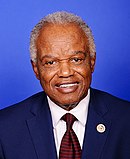Democratic Party of Georgia
Democratic Party of Georgia | |
|---|---|
| Chairman | Nikema Williams |
| Senate Minority leader | Gloria Butler |
| House Minority leader | James Beverly |
| Ideology | Modern liberalism |
| National affiliation | Democratic Party |
| Colors | Blue |
| U.S. Senate | 2 / 2 |
| U.S. House | 5 / 14 |
| Statewide offices | 0 / 13 |
| Seats in the Georgia Senate | 23 / 56 |
| Seats in the Georgia House of Representatives | 79 / 180 |
| Election symbol | |
 | |
| Website | |
| georgiademocrat | |
The Democratic Party of Georgia (DPG) is the affiliate of the Democratic Party in the U.S. state of Georgia. It is one of the two major political parties in the state and is chaired by Nikema Williams.
As of 2023, Democrats control both U.S. Senate seats, 5 out of Georgia's 14 U.S. House seats, and minorities in both houses of the state legislature.
Former Democratic president Jimmy Carter served one term as Governor of the state from 1971 to 1975.
History
[edit]
For over a century, the Democratic Party dominated Georgia state and local politics with a membership largely consisting of conservative Southern Democrats. From 1872 to 2002, the Democratic Party controlled the governorship, both houses of the state legislature, and most statewide offices.
In 1976, former Democratic governor Jimmy Carter (1971−1975) was elected the 39th president of the United States.
After switching to the Republican Party in 1998, Sonny Perdue went on to defeat Democrat Roy Barnes in the 2002 gubernatorial election. In 2004, the Democratic Party lost control of the Georgia House of Representatives, putting the party in the minority for the first time in state history.
The Democratic Party of Georgia entered the 2010 elections with hopes that former governor Roy Barnes could win back the governorship. Polls showed a tight race between Barnes and Republican gubernatorial nominee Nathan Deal,[1] with some predicting a runoff election.[2] However, on election day, Republicans won every statewide office.[3]
Since the passage of the Affordable Care Act, Georgia Democrats have advocated Medicaid expansion in the state, a policy that would provide a federally subsidized healthcare plan to about 500,000 Georgians.[4][5][6] At $5.15 an hour, Georgia is one of only two states with a state minimum wage below the federal minimum wage; a priority for Georgia Democrats in the 2010s and 2020s has been increasing the minimum wage.[7][8]
Since 2016, Georgia Democrats have begun to see better results, with them getting very close to winning the governorship in 2018. In 2020, Joe Biden narrowly won the state, the first time for a Democratic presidential candidate since 1992. Not long after that, Democrats Jon Ossoff and Raphael Warnock won both of the state's U.S. Senate seats in runoff elections in 2021, the first time Democrats won statewide office since 2006.
Warnock would be elected to a full term in 2022, defeating Republican nominee Herschel Walker.
Leadership
[edit]Officers of the Democratic Party of Georgia are elected by the state Democratic committee at a January meeting following each regular gubernatorial election.[9] Officers serve four-year terms, and there is no limit on the number of terms an individual can serve as an officer. Below are the current officers:[10]
- Chair: Nikema Williams
- First Vice Chair: Matthew Wilson
- Vice Chair of Candidate Recruitment: Scout Smith
- Vice Chair of Congressional District Chairs and County Party Liaison: Sarah Todd
- Vice Chair of Constituency Groups: Vinny Olsziewski
- Secretary: Justin Holsomback
- Treasurer: Sen. Jason Esteves
- House Leader: James Beverly[11]
- Senate Leader: Gloria Butler[12]
The officers serve on the Executive Committee, which also includes the DPG's chairs of congressional districts and the DPG's representatives to the Democratic National Committee. The entire executive committee is elected by and from the DPG's State Committee, which consists of over 300 members elected by the DPG's county committees. The apportionment of State Committee members per county is determined by dividing the last census population of the state by the total number of districts in both houses of the Georgia General Assembly (233), and dividing the quotient by the last census population of each county.
Unlike most Democratic state parties where precinct committees and captains constitute the basic unit below the county level, the majority of the DPG's county committees consist of "post seat holders" elected from each county commission district.
The state party holds its state convention in the summer of gubernatorial election years following the gubernatorial primary, one of the few quadrennial Democratic state party conventions in the United States. The state convention consists of both State Committee members and equal numbers of convention delegates, as well as at-large delegates appointed by state party leadership.
Caucuses and affiliates
[edit]- AAPI Caucus
- African American Caucus
- Democratic Women's Council
- Disability Caucus
- Georgia Democratic Rural Council
- Georgia Federation of Democratic Women
- Georgia House Democrats
- Georgia Senate Democrats
- Greening Georgia
- Latino Caucus
- LGBTQ Caucus
- Senior Caucus
- Veterans Caucus
- Young Democrats of Georgia[13]
Current elected officials
[edit]Members of Congress
[edit]Democrats hold five of Georgia's 14 seats in the U.S. House of Representatives and both of Georgia's seats in the U.S. Senate.
U.S. Senate
[edit]Democrats have controlled both of Georgia's seats in the U.S. Senate since 2021:
-
Senior U.S. Senator Jon Ossoff
-
Junior U.S. Senator Raphael Warnock
U.S. House of Representatives
[edit]| District | Member | Photo |
|---|---|---|
| 2nd | Sanford Bishop |  |
| 4th | Hank Johnson |  |
| 5th | Nikema Williams |  |
| 7th | Lucy McBath |  |
| 13th | David Scott |  |
Statewide offices
[edit]The party controls none of the thirteen statewide constitutional offices such as Governor, Lieutenant Governor, Secretary of State, State Superintendent of Schools, Commissioner of Agriculture, Commissioner of Insurance, Commissioner of Labor, or state Attorney General, etc.
State Legislature
[edit]Democrats control 23 of the 56 State Senate seats and 78 of the 180 State House seats. Two-year terms of office apply to both chambers, and the entire membership of each body is elected at the same time in even-numbered years.
- Senate
- Current senators
- Senate Minority Leader: Gloria Butler (SD55)
- Senate Deputy Minority Leader: Harold V. Jones II (SD22)
- Senate Minority Caucus Chair: Elena Parent (SD42)
- House
- Current representatives
- House Minority Leader: James Beverly (HD143)
- House Minority Whip: Sam Park (HD107)
- House Minority Caucus Chair: Billy Mitchell (HD88)
Municipal
[edit]The following Democrats hold prominent mayoralties in Georgia:
- Atlanta: Andre Dickens (1)
- Savannah: Van R. Johnson (5)
- Athens: Kelly Girtz (6)
Presidential elections
[edit]Since 1948, Democrats have won Georgia's presidential electoral votes 9 times, while Republicans have won Georgia 10 times. However, in the last 10 presidential elections, Democrats have won Georgia only twice, in 1992 and 2020.

List of chairs
[edit]Elected by the state convention
[edit]- Thomas Hardeman (1872)
- L. N. Trammell (1880)
- Charles F. Clay (1883)
- B. H. Bigham (1886)
- Hoke Smith (1888)
- William Yates Atkinson (1890–1892)
- Allen Fort (1892–1894)
- Alexander Stephens Clay (1894–1898)
- Fleming W. Dubignon (1898–1900)
- E. T. Brown (1902–1904)
- E. J. Yeomans (1904–1906)
- Alexander Lawton Miller (1906–1908)
- Hewlett A. Hall (1908–1909)
- Charles R. Pendleton (1909–1910)
- W. C. Wright (1910–1912)
- William J. Harris (1912–1913)
- William S. West (1913–1914)
- E. J. Reagan (1914–1916)
- John James Flynt Sr. (1916–1920)
- William Jerome Vereen (1920–1921)
- G. E. Maddox (1925–30)
- Lawrence S. Camp (1930–32)
- Hugh Howell (1935–1937)
- Charles S. Reid (1937)
- Jim L. Gillis (1939)
- William Y. Atkinson Jr. (1942)
- J. Lon Duckworth (1943–1946)
- James S. Peters (1948–1954)
- John Sammons Bell (1954–1960)
- J. B. Fuqua (1962–1966)
- James H. Gray Sr. (1966–1970)
Appointed by the governor
[edit]- David Gambrell (1970–1972)
- Charles Kirbo (1972–1974)
- Marge Thurman (1974–1982)
- Al Holloway (1982)
- Bert Lance (1982–1986)
- John Henry Anderson (1986–1990)
- Ed Sims (1990–1994)
- John Blackmon (1994–1998)
- David Worley (1998–2001)
- Calvin Smyre (2001–2004)
Elected by the state committee
[edit]- Bobby Kahn (2004–2007)
- Jane Kidd (2007–2010)
- Mike Berlon (2011–2013)
- Nikema Williams (2013)
- DuBose Porter (2013–2019)
- Nikema Williams (2019–present)
See also
[edit]References
[edit]- ^ Real Clear Politics: Georgia Governor - Deal vs. Barnes
- ^ WSB Radio Georgia Governor: Runoff Likely[permanent dead link]
- ^ WXIA-TV Republicans Sweep Statewide Races
- ^ "State Dems pan governor's healthcare plan, call for Medicaid expansion". 11 Alive. 22 October 2020. Retrieved November 23, 2020.
- ^ "With Rural Hospitals in Danger of Closing, Kemp, Duncan Continue to Rail against Medicaid Expansion". Georgia Democrats. Retrieved November 23, 2020.
- ^ Nolin, Jill. "Dem state lawmaker urges Kemp to expand Medicaid to fight COVID-19". Georgia Recorder. Retrieved November 23, 2020.
- ^ Hallerman, Tamar. "Minimum wage vote could become defining 2020 issue in Georgia". The Atlanta Journal-Constitution. Retrieved January 29, 2021.
- ^ "Ossoff, Warnock join senators in seeking $15 minimum wage". FOX 5 Atlanta. 26 January 2021. Retrieved January 29, 2021.
- ^ "Charter of the Democratic Party of Georgia" (PDF). Democratic Party of Georgia. Archived from the original (PDF) on 2010-11-22.
- ^ "Officers". Georgia Democratic Party. July 12, 2016. Retrieved April 1, 2018.
- ^ "Representative Robert Trammell". www.house.ga.gov. Retrieved 2020-07-20.
- ^ "Senate Dems elect leadership team for 2013-14 term". AccessWDUN. Retrieved 2020-07-20.
- ^ "Caucuses". Georgia Democratic Party. July 11, 2016. Retrieved November 22, 2020.


